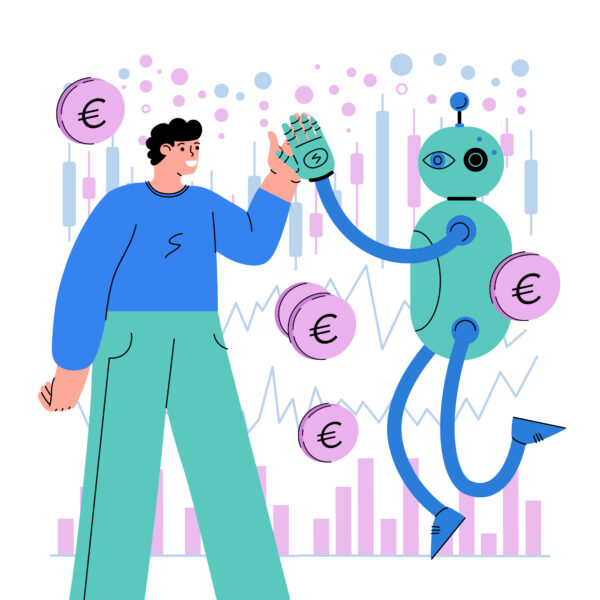The stock market has always been a place of opportunity, risk, and endless speculation. For decades, investors relied on gut feelings, financial reports, and expert opinions to make decisions. But today, a new force is transforming how we invest: artificial intelligence (AI). From Wall Street to your smartphone, AI is reshaping the stock market industry in ways that are smarter, faster, and more personalized than ever before.
Whether you’re a experienced investor or just new your toes into the market, understanding how AI is changing the game can help you make better decisions and stay ahead of the curve.

What Is AI in Investing?
Artificial intelligence refers to computer systems that can perform tasks typically requiring human intelligence—like learning, reasoning, and problem-solving. In the context of investing, AI can analyse massive amounts of data, identify patterns, and make predictions faster and more accurately than any human analyst.
Think of AI as your supercharged financial assistant. It doesn’t sleep, doesn’t get emotional, and can process thousands of data points in seconds. From predicting stock movements to managing portfolios, AI is becoming an essential tool for investors of all levels.
How AI Is Used in the Stock Market
AI is being used in several key areas of the stock market. Here are some of the most impactful applications:
1. Algorithmic Trading
This is one of the earliest and most powerful uses of AI in finance. Algorithmic trading uses computer programs to execute trades based on predefined criteria. AI takes this a step further by learning from market data and adapting strategies in real time.
- Speed and Precision: AI can execute trades in milliseconds, taking advantage of tiny price movements that humans would miss.
- Reduced Emotion: AI doesn’t panic during market dips or get greedy during rallies. It sticks to the data.
2. Predictive Analytics
AI models can forecast stock prices, market trends, and economic shifts by analysing historical data, news articles, social media sentiment, and even satellite images.
- Example: An AI system might detect that increased foot traffic near retail stores correlates with higher quarterly earnings, prompting a buy recommendation.

3. Portfolio Management
Robo-advisors like Betterment and Wealthfront use AI to build and manage investment portfolios based on your goals, risk tolerance, and time horizon.
- Automatic Rebalancing: AI ensures your portfolio stays aligned with your financial strategy.
- Tax Optimization: Some platforms use AI to minimize your tax burden through smart asset allocation.
4. Sentiment Analysis
AI can scan news headlines, earnings calls, and social media to gauge investor sentiment. This helps predict how the market might react to certain events.
- Example: If AI detects negative sentiment around a company’s leadership, it might flag the stock as high-risk.
Real-World Examples of AI in Action
Let’s look at how some companies and platforms are using AI to reshape investing:
• BlackRock
The world’s largest asset manager uses AI to analyze global economic trends and manage risk across its portfolios.
• Quant Connect
This platform allows users to build and test AI-driven trading algorithms using historical data.
• Zacks Investment Research
Zacks uses AI to rank stocks based on earnings estimates, analyst ratings, and other factors.
• Robinhood & ETRADE
These platforms use AI to offer personalized investment insights, detect fraud, and improve user experience.
Benefits of AI for Everyday Investors
You don’t need to be a hedge fund manager to benefit from AI. Here’s how it helps regular investors:
1. Better Decision-Making
AI provides data-driven insights that help you make smarter investment choices. Instead of relying on hunches, you can base decisions on real-time analysis.
2. Time Savings
AI automates tasks like research, portfolio rebalancing, and trade execution, freeing up your time for other priorities.
3. Lower Costs
Robo-advisors and AI-powered platforms often charge lower fees than traditional financial advisors, making investing more affordable.
4. Personalization
AI tailors investment strategies to your unique goals, risk tolerance, and financial situation.

Challenges and Risks of AI in Investing
While AI offers many advantages, it’s not without its challenges:
• Overreliance on Technology
Artificial Intelligence is undeniably powerful, but it is not flawless. While AI can process vast amounts of data and identify patterns beyond human capability, it cannot guarantee absolute accuracy. Financial markets are often influenced by human emotions, unpredictable behaviours, and external shocks that may not align with historical trends. In situations such as a global pandemic, sudden regulatory changes, or geopolitical tensions, even the most advanced AI models may struggle to adapt, leading to errors or misguided predictions. This highlights the need for human judgment and risk management alongside AI-driven insights.
• Lack of Transparency
Some AI systems operate as “black boxes,” making decisions without clear explanations. This can be risky if you don’t understand how your money is being managed.
• Data Privacy
AI systems often rely on personal data to make recommendations. It’s important to use platforms that prioritize data security and transparency.
• Bias in Algorithms
AI models are only as reliable as the data they are trained on. If the training data contains gaps, biases, or unbalanced information, those flaws can carry over into the model itself. This means the system may unintentionally favour certain patterns while overlooking others, resulting in distorted predictions or decisions. In finance, for example, biased data could lead to misjudging investment risks, overlooking opportunities, or even producing unfair recommendations. Such issues highlight the importance of carefully curating data, regularly monitoring AI outputs, and applying human oversight to ensure fair and accurate results.
How to Use AI in Your Investing Strategy
Ready to harness the power of AI? Here are some practical steps:
1. Try a Robo-Advisor
If you’re new to investing or want a hands-off approach, consider using a robo-advisor. It’ll build and manage a portfolio for you based on your preferences.
2. Use AI-Powered Research Tools
Platforms like Seeking Alpha, Yahoo Finance, and Finviz offer AI-driven insights to help you analyze stocks and trends.
3. Explore Algorithmic Trading
If you’re tech-savvy, you can experiment with building your own trading algorithms using platforms like QuantConnect or Alpaca.
4. Stay Informed
Follow blogs, podcasts, and news sources that cover AI in finance. The landscape is evolving quickly, and staying informed will help you adapt.
The Future of AI in the Stock Market
AI is still in its early stages, and the future holds exciting possibilities:
• Real-Time Portfolio Adjustments
Imagine a system that adjusts your investments instantly based on breaking news, economic indicators, or even weather patterns.
• Voice-Activated Investing
You could ask your virtual assistant, “Should I buy Tesla today?” and get a personalized, data-backed answer.
• AI-Powered ESG Investing
AI could help investors align their portfolios with environmental, social, and governance (ESG) values by analyzing company practices in real time.
• Decentralized AI Networks
Blockchain-based AI systems might allow investors to collaborate and share strategies securely and transparently.like oceanprotocol.
Final Thoughts
“AI is not here to replace human investors—it’s here to empower them. By automating routine tasks, analyzing complex data, and offering personalized insights, AI helps us invest smarter, not harder.
But remember: technology is a tool, not a guarantee. The best investors combine AI’s capabilities with human judgment, critical thinking, and a long-term perspective.
As AI continues to evolve, so will the opportunities for smarter investing. Whether you’re managing a retirement account or day trading from your laptop, embracing AI can help you navigate the stock market with confidence and clarity.
Thanks for reading! If you enjoyed this post, share it with your fellow investors and let me know in the comments: How are you using AI in your investing journey?”
